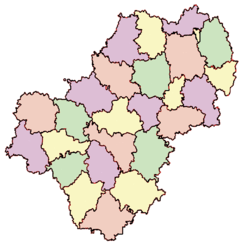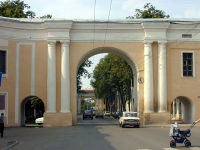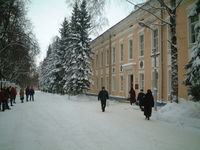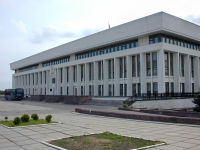Kaluga
| Kaluga (English) Калуга (Russian) |
|
|---|---|
| — Inhabited locality — | |
.svg.png) Location of Kaluga Oblast in Russia |
|
 Kaluga
|
|
| Coordinates: | |
 |
 |
| Holiday | Second Saturday of September |
| Administrative status | |
| Country | Russia |
| Federal subject | Kaluga Oblast |
| Administrative center of | Kaluga Oblast |
| Municipal status | |
| Urban okrug | Kaluga Urban Okrug |
| City Head | Nikolay Lyubimov |
| Representative body | City Duma |
| Statistics | |
| Population (2002 Census) | 334,751 inhabitants[1] |
| - Rank | 53rd |
| Time zone | MSK/MSD (UTC+3/+4) |
| Founded | 1371 |
| Postal code(s) | 248xxx |
| Dialing code(s) | +7 4842 |
| Official website | |



.jpg)
Kaluga (Russian: Калу́га) is a city in western Russia, located on the Oka River 188 km southwest of Moscow. It is the administrative center of Kaluga Oblast[2]. Population: 334,751 (2002 Census);[1] 311,319 (1989 Census).[3] It is served by Kaluga Grabtsevo Airport.
Contents |
History
Kaluga was founded in the mid-14th century as a border fortress on the southwestern borders of the Muscovy. It was first mentioned by its present name in 1371. In the Middle Ages, Kaluga was a minor settlement owned by the Princes Vorotynsky. The ancestral home of these princes is located south-west from the modern city.
Kaluga is connected to Moscow by a railway line and the ancient roadway, the Kaluga road (now partly within Moscow (as Starokaluzhskoye Shosse), partly the A101 road). This road was the favoured escape route from the Moscow trap for Napoleon in the fall of 1812. But General Kutuzov repelled Napoleon's advances in this direction and forced the retreating French army onto the old Smolensk road, previously devastated by the French during their invasion of Russia.
Kaluga was occupied by the Nazi armies in 1941. In 1944 the Soviet Government used its local military buildings to intern hundreds of Polish POW - soldiers of the Polish Underground Home Army, who were arrested by advancing Soviet front in the Vilno district.
Kaluga is known for its most famous resident, Konstantin Tsiolkovsky, a rocket science pioneer who worked here as a school teacher. The Tsiolkovsky museum in Kaluga is dedicated to his theoretical achievements and their practical implementations for modern space research, hence the motto on the city's coat of arms: "The Cradle of Space Exploration".
Economy
In recent years Kaluga has become one of the centers of the Russian automotive industry, with a number of foreign companies opening assembly plants in the area.
On 28 November 2007, Volkswagen Group opened a new assembly plant in Kaluga, with further expansion plans planned to be completed by, or during, 2009. The investment has reached more than 500 million Euro. The plant currently assembles the Volkswagen Passat and Škoda Octavia. Planned annual capacity from 2009: up to 150,000 vehicles.[4]
On 15 October 2007, the Volvo Group broke ground on a new truck assembly plant, scheduled to be finished in early 2009. Once completed the plant is expected to have yearly capacity of 10,000 Volvo and 5,000 Renault trucks.[5]
On 12 December 2007, PSA Peugeot Citroën announced its decision to build a new assembly plant in Kaluga, scheduled to be finished in 2010. The plant is slated to produce midsize passenger vehicles.[6]
On 28 December 2007, Mitsubishi Motors announced its intent to build an assembly plant in Kaluga with the initial annual production capacity of 50,000 cars.[7]
Transport
City transport is presented by trolleybuses, buses and marshrutkas.
Trolletbus routes:
- 1.Railroad station-Chiolkovsky Park
- 2.Terepets-Chiolkovsky Park
- 3.Peace Square-Victory Square-KZTA factory-Stary Torg-Peace Square (Circle route)
- 4.Peace Square-Dubrava Settlement
- 5.Sewing factory-Severny Settlement
- 6.Severny Settlement-Dubrava Settlement
- 8.Ol'govskaya Street-Market
- 9.Market-Severny Settlement
- 10.Gur'yanova Street-Market
- 12.Railroad station-Sewing factory
- 13.KZTA factory-Peace Square (only in rush hours)
- 14.Ol'govskaya Street-Moscow Square (only in rush hours)
- 15.Gur'yanova Street-Moscow Square (only in rush hours)
- 17.Terepets-Market
- 18.Victory Square-General Popov Street (right bank)
Canceled routes:
- 7.Peace Square-Radiolamp factory
- 16.Poselkovaya Street-30th department
- 17A.Terepets-Poselkovaya Street
Notable people
- Aleksandr Amfiteatrov
- Yuri Averbakh
- Mykola Azarov
- Alexander Chizhevsky
- David Edelstadt
- Jonah of Manchuria
- Andrei Kalaychev
- Valery Kobelev, Ski jumper.
- Vadim Kosmatschof (born in 1938 in Kaluga), sculptor and painter
- Mikhail Linge
- Pavel Popovich Cosmonaut, only person to receive two honorary citizenships of Kaluga (1962 and 1964)[8]
- Nikolai Rakov
- Imam Shamil
- Nikolay Skvortsov, swimmer
- Yuliya Tabakova
- Konstantin Tsiolkovsky
- Georgy Zhukov
- Olesya Zykina
International relations
Twin towns — Sister cities
Kaluga is twinned with:
See also
- Tsiolkovsky State Museum of the History of Cosmonautics
External links
- Article in German about Kaluga plant
- Regional Information
- Konstantin E. Tsiolkovsky State Museum of the History of Cosmonautics, official website in English
- Forum Kaluga
- Kaluga city places of interest views
- Pictures of streets, nature and famous places of Kaluga
- Kaluga`s sites review
References
- ↑ 1.0 1.1 Федеральная служба государственной статистики (Federal State Statistics Service) (2004-05-21). "Численность населения России, субъектов Российской Федерации в составе федеральных округов, районов, городских поселений, сельских населённых пунктов – районных центров и сельских населённых пунктов с населением 3 тысячи и более человек (Population of Russia, its federal districts, federal subjects, districts, urban localities, rural localities—administrative centers, and rural localities with population of over 3,000)" (in Russian). Всероссийская перепись населения 2002 года (All-Russia Population Census of 2002). Federal State Statistics Service. http://perepis2002.ru/ct/html/TOM_01_04_1.htm. Retrieved 2009-08-19.
- ↑ О Калуге, Официальный сайт Городской Управы г. Калуга (Russian)
- ↑ "Всесоюзная перепись населения 1989 г. Численность наличного населения союзных и автономных республик, автономных областей и округов, краёв, областей, районов, городских поселений и сёл-райцентров. (All Union Population Census of 1989. Present population of union and autonomous republics, autonomous oblasts and okrugs, krais, oblasts, districts, urban settlements, and villages serving as district administrative centers.)" (in Russian). Всесоюзная перепись населения 1989 года (All-Union Population Census of 1989). Demoscope Weekly (website of the Institute of Demographics of the State University—Higher School of Economics. 1989. http://demoscope.ru/weekly/ssp/rus89_reg.php. Retrieved 2007-12-13.
- ↑ [1]
- ↑ New Volvo Group assembly plant in Kaluga, Volvo Group corporate news, October 15, 2007
- ↑ PSA Peugeot Citroën to Build Plant in Kaluga, Russia, PSA Peugeot Citroën press release, December 12, 2007
- ↑ Mitsubishi signs contract to build plant in Kalug, RIA Novosti, December 28, 2007
- ↑ "Ими гордится Калуга ("They Bring Pride to Kaluga")" (in Russian). Kaluga: Office of the Affairs of the Mayor of Kaluga. http://www.kaluga-gov.ru/index.php?do=cat&category=imi_gorditsja_kaluga. Retrieved 2009-10-01.
|
||||||||||||||